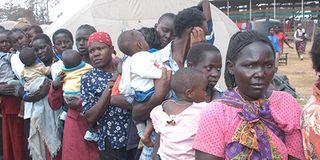Is Kenya experiencing a baby boom?

Some of the women with their babies queue to get portion of food at the Afraha stadium where about 3000 internaly displaced people are camping. The food was donated by The Nakuru Christian Proffesionals Association [NCPA]. PHOTO/ FILE
The number of women giving birth in public and private hospitals has increased in the last nine months with the figures expected to rise, a survey conducted by the Saturday Nation has shown.
Maternity wings in various hospitals in Nairobi have recorded an increase in the number of births.
Though experts point a finger at the election campaigns and the violence that followed, it has emerged that there was an acute shortage of contraceptives in August and December last year.
Huge impact
But doctors say the impact of the contraceptives shortage was minimal and could not have possibly led to an upsurge in pregnancies.
The head of disease control at the ministry of Health, Dr Willis Akwale said the shortage was confined to only a few areas and could not have resulted in a baby boom.
He bases his argument on reports from district coordinators which do not show that the shortage had a huge impact.
Dr Akwale said the ministry could not conclusively talk of an imminent “baby boom” until the end of this month.
Second World War
A baby boom is a phenomenon that occurred after the Second World War between 1943 and 1960 when several English-speaking countries, especially the US, experienced a huge surge in births.
A person born in this period is known as a baby boomer.
A survey by the Saturday Nation in hospitals such as Pumwani Maternity Hospital, Kenyatta National Hospital, Nairobi Women’s Hospital and the Nairobi Hospital showed an increase in the number of babies born in 2008 compared to 2007.
At Nairobi Hospital, l,249 babies were born by the end of September this year compared to 1,121 last year. Kenyatta National Hospital had 7,436 deliveries compared to 6,320 in September last year while Nairobi Women’s Hospital recorded a 20 per cent increase in deliveries from last year.
And this, is not any different in hospitals in all the other provinces of the country.
Dr Njoroge Waithaka, a gynaecologist at Kenyatta National Hospital attributes the increased deliveries to factors like the post-poll violence when movement was limited, forcing people to stay indoors.
Though he could not conclusively say there had been a baby boom, he said September and October are usually busy in the maternity wards as babies from December festivity adventures are born.
“This also explains why there are more abortions in February and March,” he said.
Birth registration records indicate a significant increase in the number of babies registered this year.
Up to September 2007, a total of 466,747 babies were registered, compared to 500, 786 registered by the end of September this year.
The experts concur that will be a significant rise in the number of children born at the end of November when the post-election crisis factor comes into play.
“During the post-election chaos early in 2008, sex was a symbol of conquest and punishment. Captured women and those in vulnerable circumstances were raped or enticed into sexual liaisons on a continuous basis, inevitably leading to pregnancies,” said Dr Eric Ontita, a sociologist at the University of Nairobi.
Relative comfort
Violations against women, especially rape, have been highlighted in the Waki report.
“Food rations, clothing and shelter were slow in coming to the refugee camps, especially in areas like Gusiiland, and this is where sex and ‘marriage’ were most prevalent. “Young women and girls had to choose between staying out in the cold or in relative comfort with sex pests,” said Dr Ontita.
He said in cities and towns such as Nairobi, Nakuru, Kisumu and Mombasa, residents were under official and non-official curfews.
“This brought couples to a greater level of intimacy and, with contraceptives long finished, pregnancies were the result,” he said.




